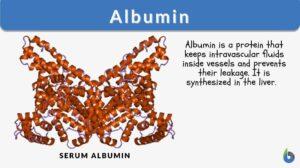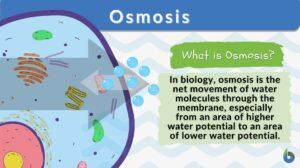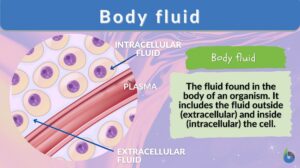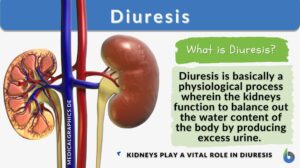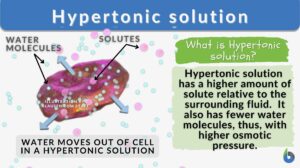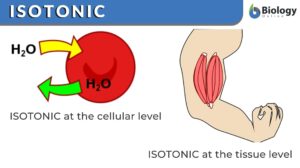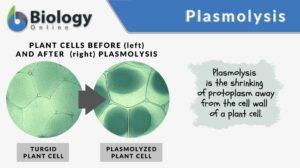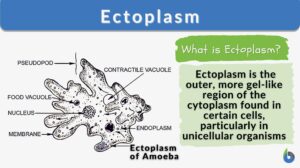Search Results for: osmotic pressure
Osmotic pressure
Osmotic Pressure Definition Osmotic pressure is the pressure caused by a difference in the amounts of solutes (or... Read More
Turgor pressure
In biology, turgor pressure pertains to the pressure that is exerted by the fluid (e.g. water) against the cell wall. It is... Read More
Body fluid
Body Fluids Definition What is body fluid? Literally, body fluid is the fluid of the body. The adult human body is ~50-60%... Read More
Hypertonic solution
Hypertonic Solution Definition Hypertonic solution is a relative term that describes the solution having a higher amount of... Read More
Hyperosmotic
Hyperosmotic Definition What is hyperosmotic? The word hyperosmotic is derived from two Greek words: 'hyper', meaning... Read More
Hypotonic solution
Hypotonic Solution Definition What is a hypotonic solution? It refers to a solution that contains a lower amount of solute... Read More
Hypertonic
Hypertonic Definition Hypertonic is a term used to describe an entity being in the state of hypertonicity, where there is a... Read More
Homeostasis
Homeostasis is the tendency not to stray from the range of favorable or ideal internal conditions. Such conditions must be... Read More
Circulation
Blood Blood is composed of a liquid, plasma, and blood cells such as erythrocytes (red blood cells,) leukocytes (white... Read More
Plasmolysis
Plasmolysis is the shrinking of protoplasm away from the cell wall of a plant or bacterium. The protoplasmic shrinking is... Read More
Movement of Molecules Across Cell Membranes
Diffusion Diffusion is essentially the movement of molecules from a region of higher concentration to a region of lower... Read More
Water in Plants
The movement of molecules, specifically water and any solutes, is vital to understand in light of plant processes. This will... Read More
Hyposmotic
Definition adjective 1. Of, relating to, or characterized by having a lower osmotic pressure than a surrounding fluid under... Read More
Kidneys and Regulation of Water and Inorganic Ions
Renal Functions Kidneys remove/add substances from/to the plasma. Regulate water concentration, inorganic ion... Read More
Vant hoffs law
van't Hoff's law In stereochemistry, all optically active substances have one or more multivalent atoms united to four... Read More
Transudate
Definition noun, plural: transudates A fluid passing through a mebrane, a pore, or an interstice, and accumulating in... Read More
Transudation
Definition noun (1) The act, process, or condition of transuding, i.e. the oozing or passing gradually of a liquid possibly... Read More
Hydrostatic pressure
Definition noun The pressure exerted or transmitted by the fluid (e.g. water) at rest. Supplement Hydrostatic pressure... Read More
Hypertonicity
Definition noun The state of being hypertonic, i.e. having a greater degree of tone or tension Supplement In biology,... Read More
Hypotonicity
Definition noun The state of being hypotonic, i.e. having lesser degree of tone or tension Supplement In biology, tonicity... Read More
Carbohydrate
Carbohydrate Definition A biomolecule refers to any molecule that is produced by living organisms. As such, most of them... Read More
Osmotic lysis
Definition noun The bursting or rupturing of cell membrane due to osmotic movement of water into the cell when the cell... Read More
Primary cell wall
Definition noun plural: primary cell walls ˈpɹaɪməɹi sɛl wɔːl The layer of the plant cell wall that forms prior to... Read More
Middle lamella
Definition noun plural: middle lamellae ˈmɪdəl ləˈmɛl.ə A pectin-rich intercellular material that glues the... Read More
Secondary cell wall
Definition noun plural: secondary cell walls ˈsɛkənˌdɛɹi sɛl wɔːl The layer of the plant cell wall that forms... Read More
![Osmotic pressure n., plural: osmotic pressures [ɑsˈmɑtɪk ˈpɹɛʃ.ɚ] osmotic pressure definition and example](https://www.biologyonline.com/wp-content/uploads/2020/11/osmotic-pressure-definition-and-example-300x168.jpg)

